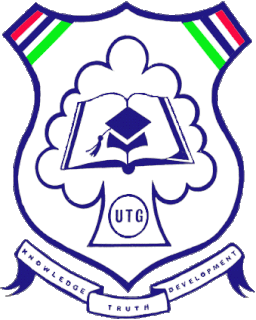The Bathurst Trade Union (BTU) was the first trade union in The Gambia and the first legally registered trade union in the African continent. [1] :191 Founded by Edward Francis Small in 1929 in Bathurst (now Banjul), the organisation emerged from the Carpenters' and Shipwrights' Society.

A trade union is an association of workers forming a legal unit or legal personhood, usually called a "bargaining unit", which acts as bargaining agent and legal representative for a unit of employees in all matters of law or right arising from or in the administration of a collective agreement. Labour unions typically fund the formal organization, head office, and legal team functions of the labour union through regular fees or union dues. The delegate staff of the labour union representation in the workforce are made up of workplace volunteers who are appointed by members in democratic elections.

The Gambia, officially the Republic of The Gambia, is a country in West Africa that is almost entirely surrounded by Senegal with the exception of its western coastline along the Atlantic Ocean. It is the smallest country within mainland Africa.
Edward Francis Small was a Gambian statesman who has been described as the "trailblazer of Gambian political consciousness." One of the few educated Africans in the Gambia Colony and Protectorate during the early 20th century, Small founded the country's first trade union, the country's first political party, and was the first citizen elected to its legislature. He was also a delegate to and leader of the National Congress of British West Africa (NCBWA).
In October the same year the BTU was joined by other craft associations. The BTU received support from the British Labour Research Department and the British section of the League against Imperialism. In the fall of 1929, BTU led a 3-week strike and membership grew rapidly that by April 1930 membership stood at around 1,000.
The Labour Research Department (LRD) is an independent trade union based research organisation, based in London, that provides information to support trade union activity and campaigns. About 2,000 trade union organisations, including 51 national unions in the UK, representing more than 99% of total Trades Union Congress (TUC) membership, are affiliated.
The League against Imperialism and Colonial Oppression was a transnational anti-imperialist organization in the interwar period. It has been referenced as in many texts as World Anti-Imperialist League or simply and confusingly under the misnomer Anti-Imperialist League.
Later, the BTU was torn apart by internal divisions. In 1932 Small was challenged for the union's leadership by J. L. Njie. The conflict had both political and ethnic aspects (Njie was a Wolof). Njie had the support of the conservative elites of the city, who were uncomfortable with Small's activism. In March 1933, Njie registered the BTU with himself as its chairman. Small tried to regain power of the BTU for two years, but in May 1935 he broke away and formed the Gambia Labour Union instead. [2]

The Wolof people are a West African ethnic group found in northwestern Senegal, the Gambia, and southwestern coastal Mauritania. In Senegal, the Wolof are the largest ethnic group (~43.3%), while elsewhere they are a minority. They refer to themselves as Wolof and speak the Wolof language, in the West Atlantic branch of the Niger–Congo family of languages.
In the 1961 groundnut trade season, Alieu Ebrima Cham Joof — a member of the Select Committee and an old protegế of Edward Francis Small together with his associates at the Gambia Workers' Union organised a national strikes against the British colonial authorities and the Chambers of Commerce. The purpose of that strike was to demand proper remuneration for the daily paid workers who were poorly paid. The strike went on for five days. In that strike, Joof jumped on the stage and proclaimed to his followers that he is going to set the country on fire if needs be but "nobody is going to work for them" [the British]. [3]

Alieu Ebrima Cham Joof commonly known as Cham Joof or Alhaji Cham Joof, was a Gambian historian, politician, author, trade unionist, broadcaster, radio programme director, scout master, Pan-Africanist, lecturer, columnist, activist and an African nationalist who advocated for the Gambia's independence during the colonial era.
The Gambia Workers' Union (GWU) was a general trade union in Gambia.



